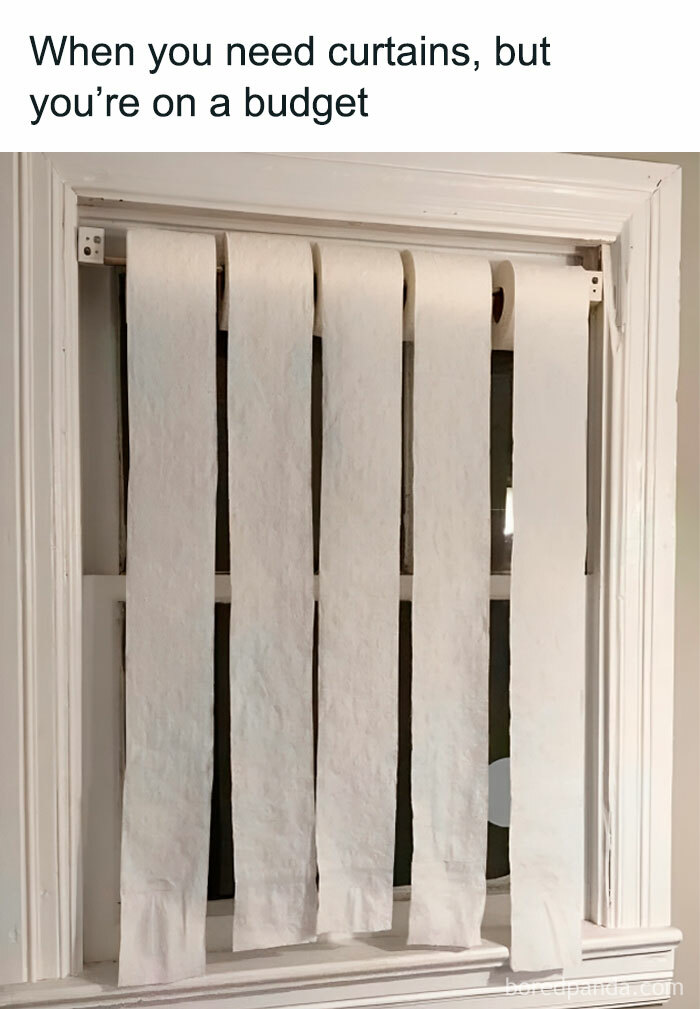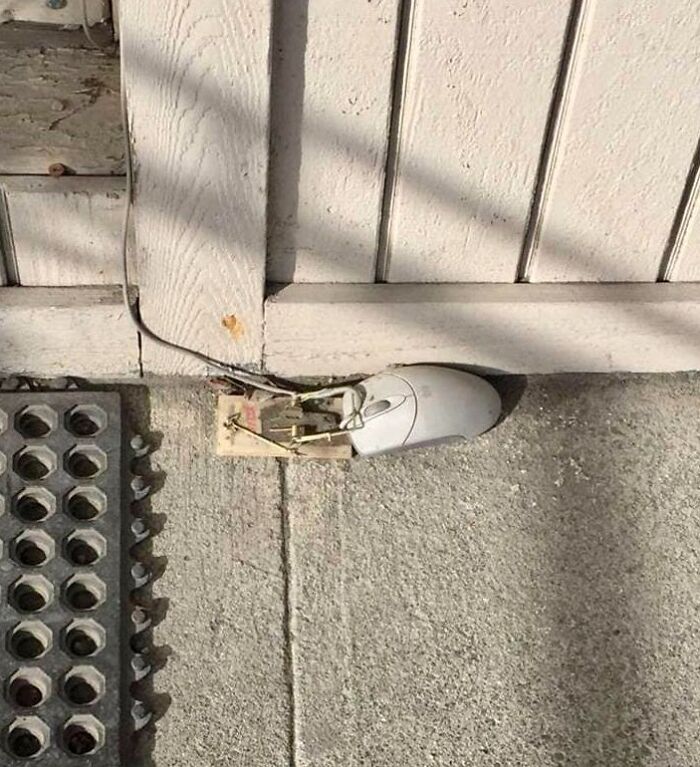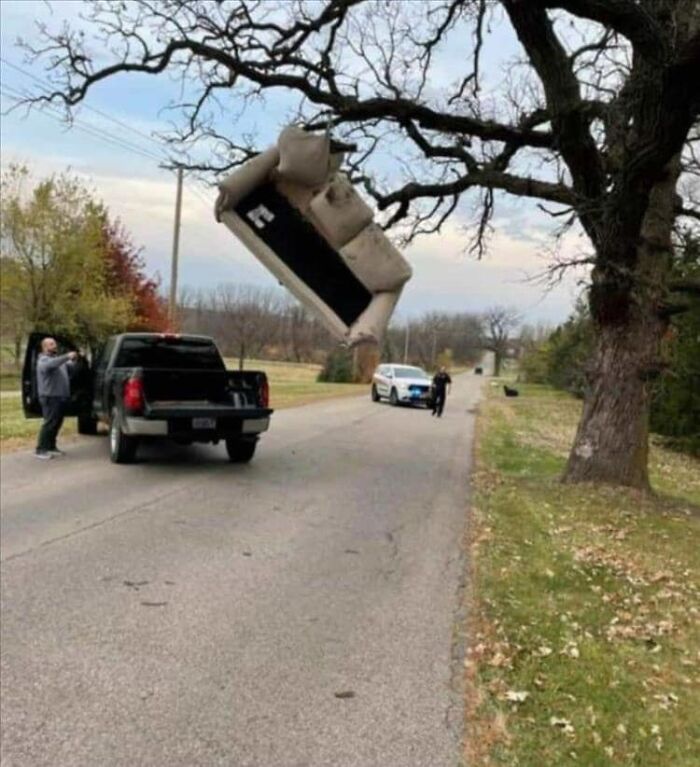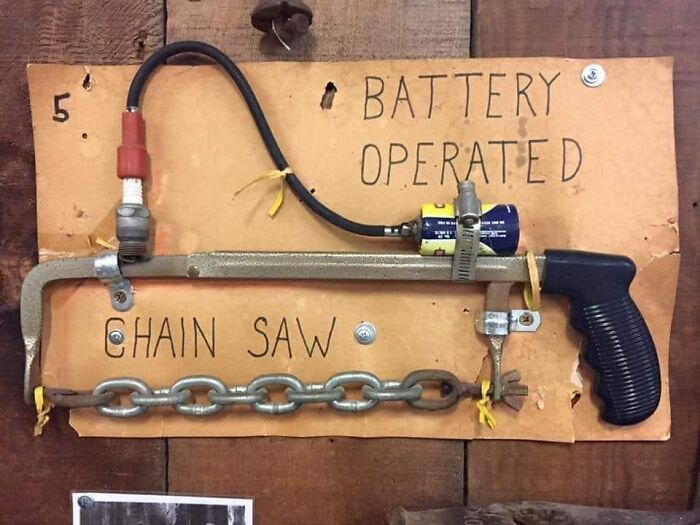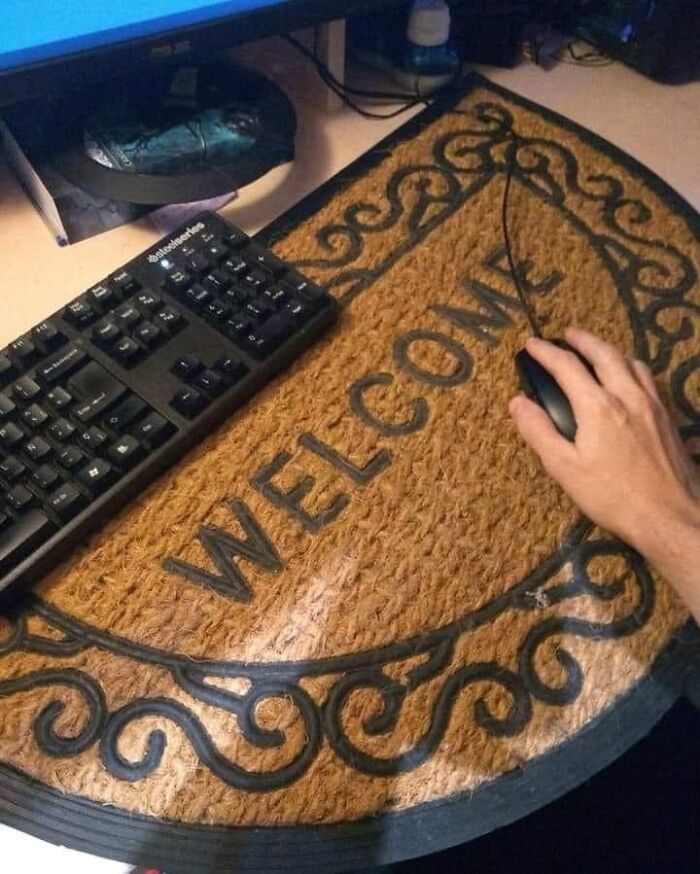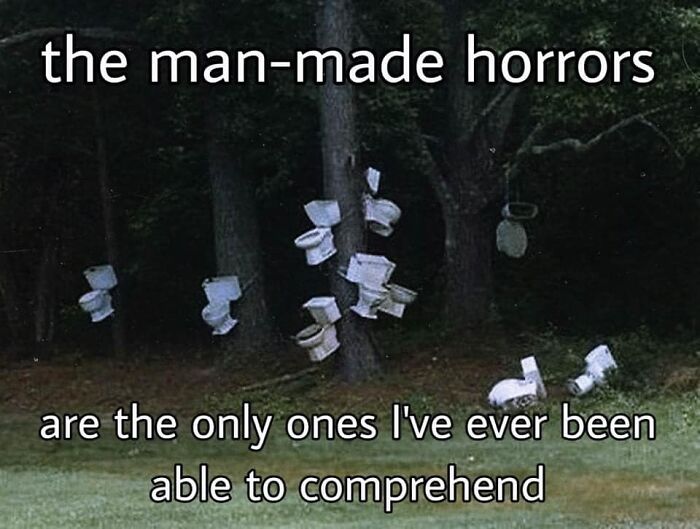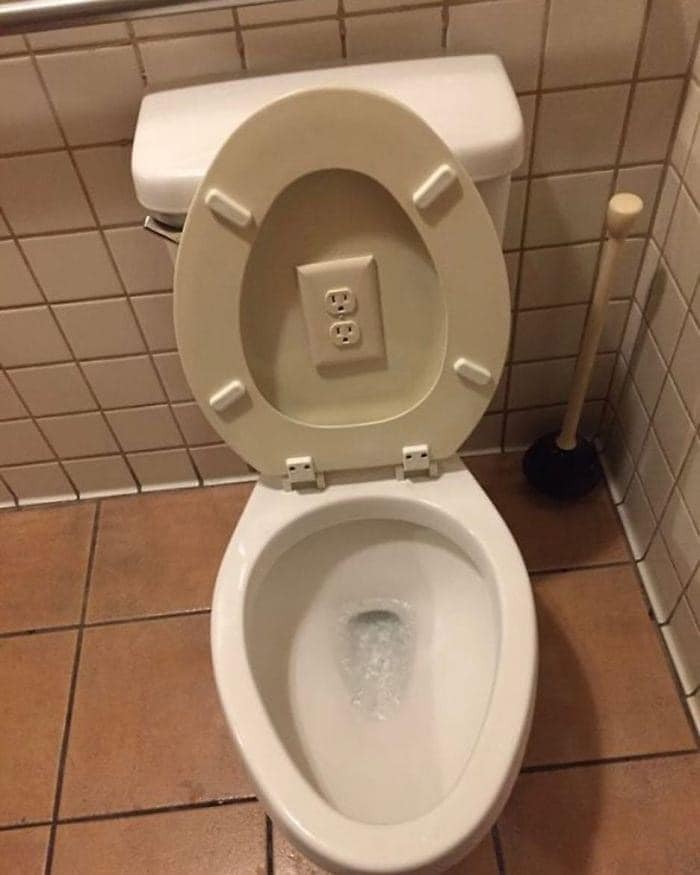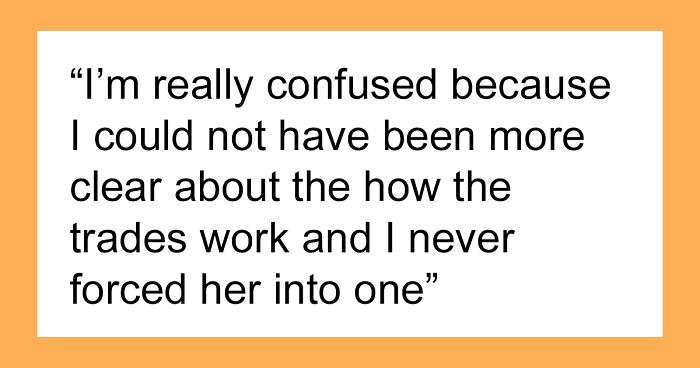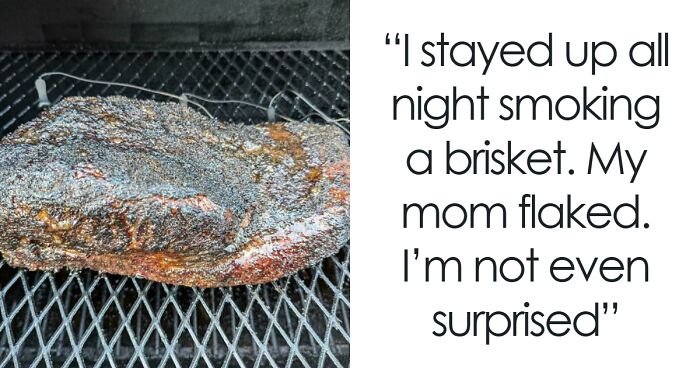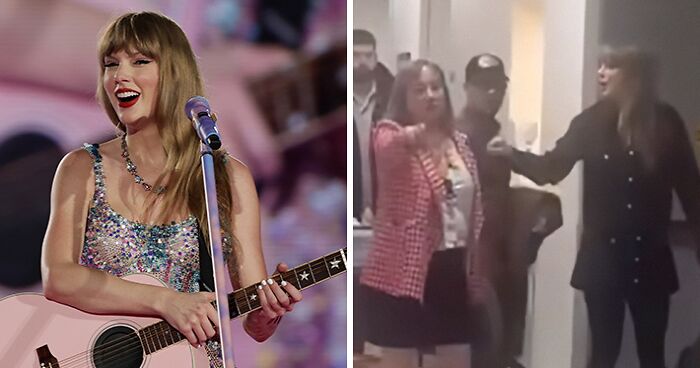Inanimate objects can't move by themselves. Someone or something has to move them. That's how they can end up in places they don't belong. Sometimes randomly, sometimes with intent, but the result can be both funny and unsettling. Like a tambourine next to the shower gel in the bathroom. Or cutting a pizza with a CD. Some can unsettle us, others elicit quite a chuckle out of us.
The Facebook page Things In Places It Shouldn’t Be dedicates its content exactly to that. Their follower count has doubled since the last time we covered it – they now have over 43k. So check out the newest selection of random things in weird places we've picked out for you, dear pandas!
This post may include affiliate links.
So why do we find random things that are out of place so funny? Well, according to one of the theories of humor, it's because we see amusement in the incongruous. That's a big word, but the simplest alternative would be things that are "unexpected" or "out of place".
The Stanford Encyclopedia of Philosophy names the incongruity theory as the dominant one today. Three of the biggest names in philosophy are behind it: Kant, Schopenhauer, and Kierkegaard. The main idea behind it is that the cause of laughter is something unpredictable. "Something that violates our mental patterns and expectations," according to the encyclopedia.
To give an easy example of the theory, let's look at stand-up comedy. A joke can work when the punchline is such that an audience doesn't expect it. A set-up creates a certain expectation, but the ending to a joke can be incongruous – it violates that expectation.
We can apply the same logic to humor on the internet – memes, videos, and all kinds of pictures in general. In each photo in this list, we find an item that doesn't exactly fit into the casual context of the picture. Who would expect to find a sofa hanging from a tree branch? It thus violates what we expect to see and makes us bust out a laugh or two. As Alex Borgella puts it, “we find humor in the incongruity between our expectations and reality.”
The Stanford Encyclopedia names Scottish poet James Beattie as the first to tackle incongruity in humor. There were some mentions of the idea in Aristotle's and Cicero's works. But today, scholars consider Beattie to be the first. In his theory, there have to be two or more inconsistent, unsuitable parts united in one object. Our mind finds humor in the "peculiar manner" of their "mutual relation," Beattie wrote.
It ain’t stupid if it works… and also if you get a free mouse
Then comes Kant. He didn’t write about the theory of incongruity per se but used “the unexpected” to explain why we laugh at jokes. To him, laughter is a reaction to an unexpected, absurd, illogical, or inappropriate situation. It's when a “strained expectation” transforms into nothing.
Ugh I know! smh those stupid batteries
Load More Replies...When you're almost finished painting the bricks but you run out of clear coat...
Right?! Even if that brick wall is actually made of cardboard or styrofoam, it would be tough to get the ladder to stay in place. I'm seriously impressed. [Edit: I see it now. Everything under that square patch of grass must be counterweight. Metal stand probably. Still impressed.]
Load More Replies...I would think it's more like a glitch in a Sims game.
Load More Replies...This is doable. I have a ladder I don't need and a window that was replaced. I'll just have to get some 2x3 studs and paint them brick color.
Reminds me of one of the Creepypastas on YouTube. It's about staircases in the middle of the forests. Leading to another dimension.
It can be unclear what "transforming into nothing" means. Professor of Philosophy John Lippitt takes a scene from the TV show Cheers as an example to explain it.
"The bar slob Norm, after yet another evening's sitting around drinking, announces that he is leaving, since he has promised his much neglected wife that he will pick up some Chinese food. 'That's nice of you', someone comments, surprised. 'Yeah, well', says Norm, 'I spilled it on the carpet this morning'.”
If we look at the previous scene from Kant's perspective, "we have followed the wrong path," Lippit writes. We assume a different meaning for the phrase "pick up", thinking the character will stop by a Chinese restaurant to buy food. Instead, he means he will literally have to scoop it up from the floor. The punchline is different from what we expected, therefore our expectation is "reduced to nothing."
Schopenhauer somewhat improves Kant's take. While Kant wrote about our expectations vs. our experience, Schopenhauer includes our perceptions. We find humor in the incongruity "between a concept and the real objects which have been thought through it in some relation," according to him.
Lippitt takes Schopenhauer's joke as the best example of his ideas. "[A] king who comes across a peasant dressed in light summer clothing in the depth of winter, which greatly amuses the king. The peasant says: 'If your majesty had put on what I have, you would find it very warm'. The king asks what he has put on, and receives the reply: 'My whole wardrobe!'"
In the joke above, "whole wardrobe" refers to the king's vast selection of clothes and the peasant's one summer coat. "The humor arises, Schopenhauer claims, from the incongruity of the latter with the concept," Lippit writes.
Kierkegaard locates the essence of humor when contrasting what we expect and what we experience. He puts comedy and tragedy side by side. "The tragic and the comic are the same, in so far as both are based on contradiction." But the tragic, according to him, is a suffering contradiction. The comic – a painless one.
Even if their ideas are today considered foundational, Kant, Schopenhauer, and Kierkegaard weren't scholars of comedy. There are other, more recent academics who have written extensively on humor and comedy. Henri Bergson's essay Laughter is now considered the most influential work on comedy. John Morreall and Marie Collins Swabey are among other modern scholars that our deep thinker pandas might want to check out!
It needs binding material, otherwise things will just end up in the ditch..
It's annoying because this didn't use to happen before. Where should we report these issues?
Load More Replies...Just wondering. Are there any intelligent people living in America. Just asking. Oh and they never spell check or are they not literate either. 😂😂😂😂
It's annoying because this didn't use to happen before. Where should we report these issues?
Load More Replies...Just wondering. Are there any intelligent people living in America. Just asking. Oh and they never spell check or are they not literate either. 😂😂😂😂

 Dark Mode
Dark Mode 

 No fees, cancel anytime
No fees, cancel anytime 




















